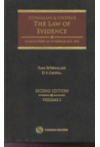
- Author(s): Ram Jethmalani, DS Chopra
- Publisher: West Thomson Reuters
- Edition: 2 Ed 2016
- ISBN 13 9789384746865
- Approx. Pages 2365 + Contents
- Delivery Time 3-5 working days (within Kerala & South India) (Others 7-9 days)
.............................................................................................................................
Description
Substantive law deals with rights, duties and liabilities while adjective law regulates the pleadings, procedure and proof by which the substantive law is to be enforced. Evidence law is an example of adjective law. The first law of evidence was Act 15 of 1852 followed by Act 2 of 1853.
The first draft was drawn by Her Majesty Commissioner Sir Henry Maine the legal member of the Council. However it did not meet with approval. A new bill was drafted by Sir James Fitzjames Stephen and passed as The Indian Evidence Act, 1872. It was adopted in Sri Lanka. Burma, Malaysia, Singapore and large parts of Africa such as Kenya, Uganda and Nigeria.
The element of oath is not covered under the Evidence Act but it is dealt with under the Oaths Act, 1969. Both evidence and oath are covered under entry 12 of the concurrent list in the Indian Constitution.
The Indian Evidence Act, 1872 is divided into eleven chapters and is spread over 167 sections.
This book is an exhaustive section wise commentary covering judgments of the Supreme Court, Privy Council and all the High courts. The judgments of the Privy Council are precise, easy to read and understand and invariably followed by the Supreme Court. Pulukuri Kottaya v. Emperor, AIR 1947 PC 67
under section 27 is a leading example as it has been followed by the Supreme Court and the High Court's several time. The judgments of the Supreme Court on several important topics lack clarity and consistency.
Evidence Act has stood the test of time. It has required very few amendments, except those made by the Information Technology Acts and some minor changes by the Criminal Law (Amendment) Acts, 1983,2005 and the recent Ordinance making changes in rape laws.
.............................................................................................................................
Contents
Volume - 1
The Law of Evidence
Indian Evidence Act, 1872
Preamble
Part I - Relevancy of Facts
I. Preliminary
II. Of The Relevancy of Facts
Part II - On Proof
III. Facts which need not be proved
IV. Of Oral Evidence
V. Of Documentary Evidence
VI. Of The Exclusion of Oral by Documentary Evidence
Volume - 2
Part III - Production and Effect of Evidence
VII. The Burden of Proof
VIII. Estoppel
IX. Of Witnesses
X. Of The Examination of Witnesses
XI. Of Improper Admission and Rejection of Evidence
The Schedule
.............................................................................................................................
Author Details
Ram Jethmalani, LL.M., Senior Advocate, Supreme Court of India, Former Union Minister of Law and Justice.
Prof.D.S. Chopra, B.Sc., LL.M., New Law College, Bharati Vidyapeeth Deemed University, Pune.
.............................................................................................................................
